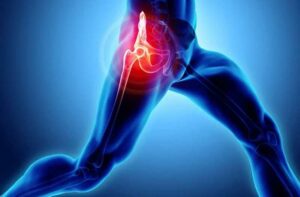If you’re like most runners, you probably experience some soreness in your hip flexors the day after a run. This sore hip flexor after running is perfectly normal, and there are a few things that you can do to help alleviate the pain. In this blog post, we will discuss the causes of hip flexor soreness after running, as well as some tips on how to prevent it from happening. We hope that this information will help you stay healthy and injury-free!
Contents
Reasons For Sore Hip After Running

There are several reasons why your hip flexor might be sore after running. It could be due to overuse, tightness in the muscles, or incorrect form. Let us discuss them in detail:
Overuse
If you are new to running or have recently increased your mileage, then it is possible that you are overusing your hip flexor muscles. This can lead to micro-tears in the muscles, resulting in pain and soreness.
Tightness In The Muscles
Another common reason for hip flexor soreness after running is tightness in the muscles. If your muscles are tight, they will be unable to move through a full range of motion. This can lead to inflammation and pain. It is important to stretch your hip flexor muscles regularly to keep them loose and prevent this problem.
Incorrect Form
If you are running with incorrect form, it can put unnecessary stress on your hip flexor muscles. This can lead to inflammation and pain. Make sure to run with good form to avoid this problem.
If you are experiencing hip flexor soreness after running, it is important to rest and ice the area. You should also stretch and massage the muscles to help them recover. If the pain persists, you should see a doctor to rule out any other potential causes.
What Is The Medical Term For This?
Soreness in the hip flexor post-running is a common occurrence. The medical term for this is “delayed-onset muscle soreness” (DOMS). DOMS typically occurs 12-24 hours after running and can last up to 72 hours. It is caused by microtrauma to the muscle fibres which leads to inflammation and pain. The good news is that DOMS is not a serious condition and will not cause long-term damage to the muscles. There are several things you can do to treat DOMS and prevent it from happening in the future.
Ways To Prevent It From Happening

Your hip flexor is a group of muscles that helps you lift your leg up. It’s located at the front of your hip and connects your thighbone to your lower spine. When these muscles are overworked, they can become irritated and cause pain.
You can prevent this by doing the following:
Warming up
Before you start running, make sure you warm up properly. This will help loosen your muscles and prepare them for exercise.
Stretching
After you warm up, take some time to stretch your hip flexor muscles. This will help prevent them from becoming tight and sore.
Strength training
Incorporating strength-training exercises into your routine can help improve the strength and endurance of your hip flexor muscles.
Cross-training
In addition to running, try incorporating other activities into your routine such as biking or swimming. This will help give your hip flexors a break from the repetitive motion of running.
Proper shoes
Wearing supportive and comfortable shoes while you run can help reduce the stress on your hip flexor muscles.
First Aid Treatment For Sore Hip
You can do the following to relieve your sore hip flexor after running:
- Ice: Apply an ice pack to the affected area for 20 minutes at a time. This will help reduce inflammation and pain.
- Heat: You can also use heat to relieve pain. Apply a heating pad to the affected area for 20 minutes at a time.
- Rest: Take a break from the activity to allow your hip flexor muscles to recover.
- Stretching: Gently stretch the affected muscles to help relieve pain and improve flexibility.
- Over-the-counter medication: Take over-the-counter pain relievers such as ibuprofen or acetaminophen to help reduce pain and inflammation.
When To See A Doctor For It?
 You can treat sore hip at home but it is important to see a doctor when you see these signs:
You can treat sore hip at home but it is important to see a doctor when you see these signs:
- Severe pain: You should see a doctor if you experience severe pain in your hip flexor muscles. This could be a sign of a more serious condition such as a muscle tear.
- Limited range of motion: If you’re unable to move your leg or hip due to pain, you should see a doctor. This could be a sign of a more serious condition such as muscle strain.
- Swelling: If you see swelling or bruising around the affected area, you should see a doctor. This could be a sign of a more serious condition such as a muscle tear or rupture.
- Fever: If you develop a fever, you should see a doctor right away. This could be a sign of infection.
- Numbness or tingling: If you experience numbness or tingling in the affected area, you should see a doctor right away. This could be a sign of a more serious condition such as nerve damage.
Treatment For Sore Hip Flexor
There are many forms of treatment for a sore hip flexor. Some forms of treatment are more effective than others and some people may require more than one form of treatment to get their desired results. From non-intrusive to surgical, there are many options available for treating a sore hip flexor.
Non-Intrusive Treatment Options
There are many forms of non-intrusive treatment options available for those who suffer from a sore hip flexor. One option is physical therapy. A physical therapist can help to stretch and strengthen the muscles around the hip joint which can help to take pressure off of the sore hip flexor. Other options include massage therapy and acupuncture. Massage therapy can help to loosen up the muscles around the hip joint and acupuncture can help to release endorphins which can provide pain relief.
Surgical Treatment Options
For those who do not respond to non-intrusive treatment options, there are surgical treatment options available. One option is hip arthroscopy. This is a minimally invasive surgery that can be used to treat a variety of hip problems including a sore hip flexor. During the surgery, the surgeon will make a small incision in the hip and insert a camera. This will allow the surgeon to see the inside of the hip joint and make any necessary repairs. Another surgical option is a hip replacement. This is a more invasive surgery but it can be very effective in treating a sore hip flexor. During a hip replacement, the surgeon will remove the damaged hip joint and replace it with an artificial one.
How Long Does It Take To Recover?
Recovery times depend on the intensity and duration of your run, as well as your age and fitness level. A study of marathon runners found that those who ran for more than four hours had the longest recovery times, with most not feeling back to normal for two to three weeks.
If you’re a beginner or relatively new to running, you can expect your recovery time to be on the longer end. As you build up your mileage and endurance, you may find that your body can handle longer runs with less soreness afterwards.
Conclusion
In conclusion, a sore hip flexor after running is most likely due to overuse or tightness in the muscles and tendons. Treatment typically involves icing the area, stretching, and rest. If the pain is severe, you may need to see a doctor for further treatment options.
If you’re experiencing hip flexor pain after running, there are a few things you can do to treat it but if the pain is severe, it’s best to see a doctor. Also, physical therapy is the best non-intrusive treatment for this type of pain.
Physical Therapy help patients recover from pain. If you’re experiencing Back pain, Shoulder pain, Knee pain, Neck pain, Elbow pain, Hip pain, or Arthritis pain, a physical therapist at MantraCare can help: Book a physiotherapy session.


